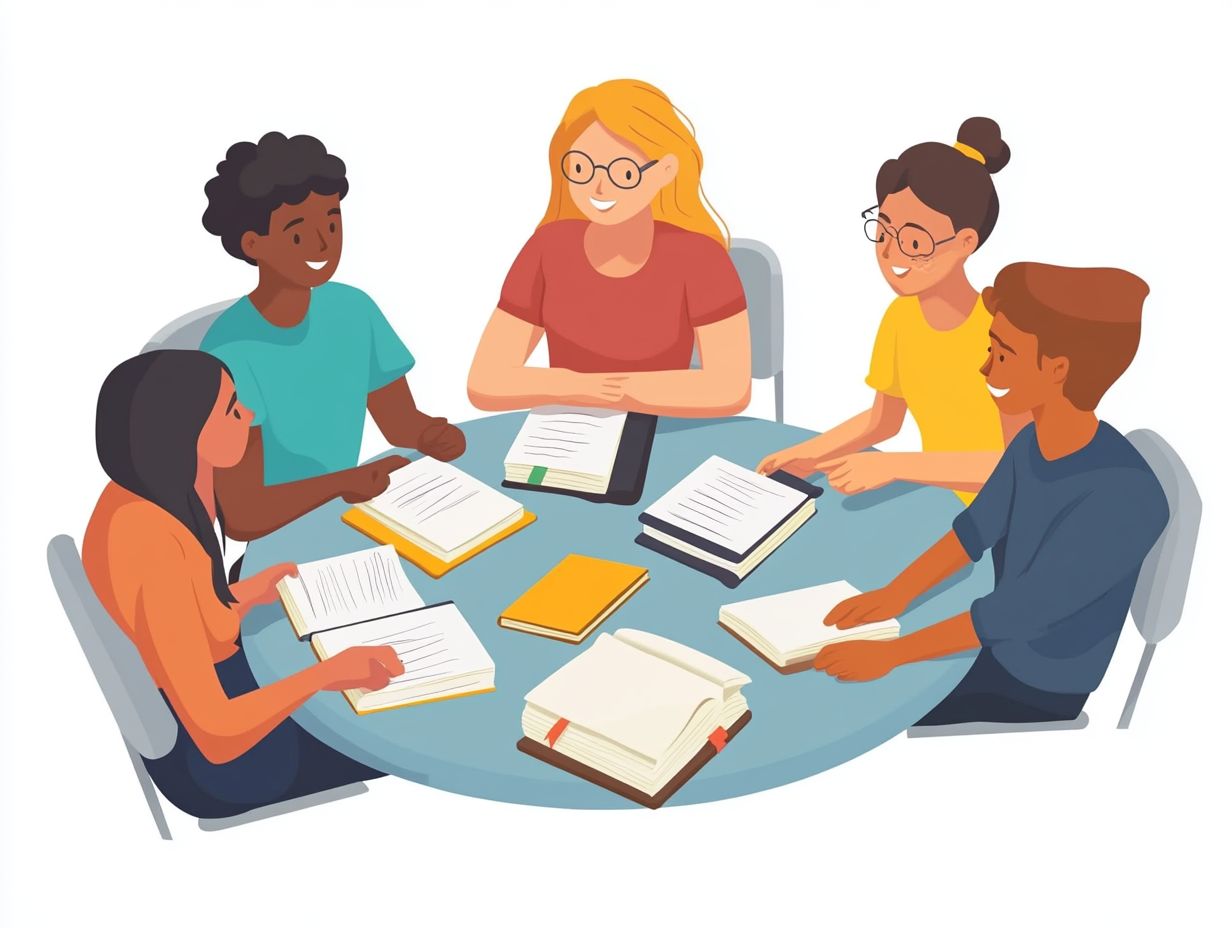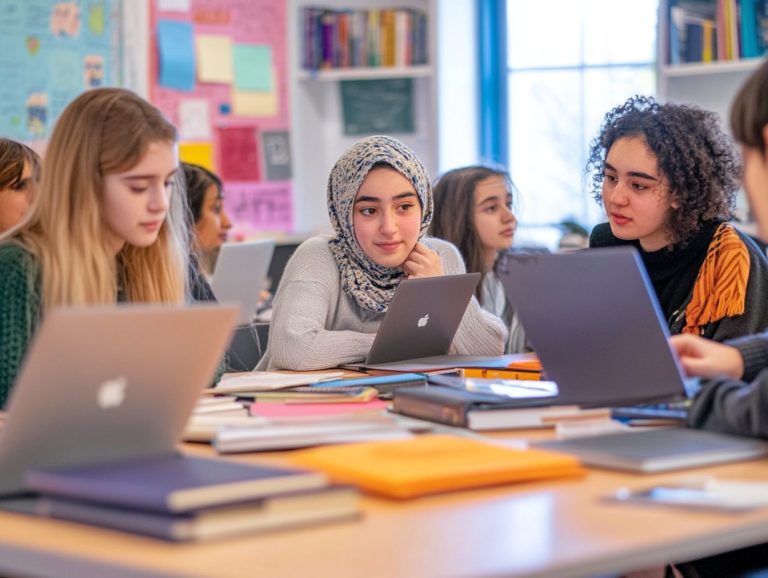How to Approach Language Learning as a Beginner
Learning a new language is an exciting adventure waiting for you! It opens doors to personal growth, cultural exploration, and enhanced career opportunities.
But where should you begin? This guide will navigate you through the essential steps of approaching language learning as a beginner.
From selecting the right language that aligns with your interests and goals to establishing realistic milestones and discovering effective resources, you ll have the tools at your disposal.
Practical tips for practicing and immersing yourself in your new language will guarantee a rewarding experience from start to finish.
Contents
- Key Takeaways:
- Choosing the Right Language
- Setting Realistic Goals
- Finding Resources for Language Learning
- Creating a Study Plan
- Practicing and Immersing in the Language
- Frequently Asked Questions
- What is the best way to approach language learning as a beginner?
- How often should I practice my new language?
- Should I focus on speaking or reading and writing first?
- Is it better to learn a language through immersion or formal classes?
- What tips can keep you motivated in your language learning journey?
- What resources are available for beginners learning a new language?
Key Takeaways:

- Choose a language that excites you!
- Set goals to stay motivated.
- Create a study plan with the best resources available.
Benefits of Learning a New Language
Learning a new language offers numerous benefits. It can enhance both your personal and professional life.
It sharpens your thinking skills. This helps with problem-solving and boosts your memory making it an invaluable tool for personal growth. In today s competitive job market, bilingual candidates are increasingly sought after; your language proficiency can easily distinguish you from the crowd.
Additionally, it opens doors to deeper engagement with diverse cultures. This enriches your social interactions and broadens your worldview. Language learning aids, like apps and online courses, offer effective strategies for mastering new vocabulary and grammar. Staying motivated is key to consistent progress.
Embracing multilingual friendships not only enhances your communication skills but also fosters a sense of belonging in an ever-evolving global community.
Choosing the Right Language
Selecting the right language to learn is a pivotal decision for any independent learner. It lays the groundwork for a rewarding language journey that aligns with your specific goals and personal interests.
As you contemplate your options, consider factors like cultural relevance, future travel aspirations, and potential career advancements. Whether you re drawn to Dutch, English, Arabic, Spanish, French, Russian, Italian, Mandarin, Japanese, or Korean, each language presents its own distinct advantages and opportunities for growth.
Factors to Consider
Think about several factors when choosing a language to learn. Consider cultural understanding and the potential for personal growth. Analyzing your specific goals whether they involve travel, career advancement, or personal enrichment can help you pinpoint the most suitable option.
Exploring various language platforms and resources can significantly enhance your motivation, making your language learning journey not just educational, but truly enjoyable.
Keep in mind the availability of learning materials, like books and apps, and consider how cultural relevance enhances your study experience. Immersing yourself in the traditions and nuances of a language can deepen your comprehension and appreciation. This cultural context can transform what might feel like mundane study sessions into captivating explorations.
Your personal motivation is another key element. Understanding your reasons for learning can fuel your commitment, whether it s about connecting with people or advancing your career. By employing effective learning techniques like immersive experiences and interactive tools you can turn the daunting task of language acquisition into an exhilarating adventure.
Setting Realistic Goals

Setting realistic and tangible goals is essential for effective language learning. These goals serve as a roadmap for measuring your personal progress and maintaining motivation throughout your journey.
By establishing both short-term and long-term objectives, you can engage in goal-oriented learning that fosters steady improvement. This approach allows you to celebrate your achievements through systems like achievement tracking.
Language apps can also play a pivotal role in supporting your goals, providing you with structured learning experiences tailored to your unique needs.
Short-term and Long-term Goals
Establishing both short-term and long-term goals empowers you to create a well-rounded approach to mastering a new language. This fosters incremental achievements and sustains motivation.
Short-term goals might include conquering new vocabulary or practicing speaking with conversation partners. In contrast, long-term aspirations could focus on achieving fluency or deepening your cultural understanding through immersive experiences like language exchanges.
Clearly defining your objectives allows you to effectively track your progress. A practical short-term goal could involve dedicating just 15 minutes each day to vocabulary apps or participating in a weekly online tutoring session.
Your long-term aspirations might encompass completing a language course or preparing for a proficiency exam. Using resources like podcasts, films, and language learning websites makes practice more engaging and effective.
Join local language clubs or online communities to significantly boost your motivation. These create valuable opportunities for conversation and real-world application.
Finding Resources for Language Learning
Finding the right resources is crucial for your success as a language learner. They equip you with the tools and materials necessary for effective learning.
You have a wealth of options at your fingertips, from cutting-edge language apps and engaging online courses to traditional books that align with your unique learning style and preferences.
Furthermore, historical dictionaries and curated materials from educational organizations can deepen your comprehension. Additionally, user-generated content adds unique perspectives and interactive experiences.
Books, Apps, and Classes
Books, apps, and classes are vital resources for you as a language learner, each offering distinct benefits tailored to various learning styles.
For example, language learning apps turn the process into a game and enhance your vocabulary through a method that helps you remember words better by repeating them at spaced intervals.
In contrast, platforms like Rosetta Stone focus on learning that includes real-life interactions with the language, honing your conversation skills.
Traditional books provide in-depth explorations of grammar and cultural nuances, essential for a nuanced understanding of the language.
Incorporating podcasts or video content into your study routine can elevate your listening skills. Setting clear and achievable goals can significantly boost your motivation and keep you engaged.
When you combine these diverse resources thoughtfully, you can dramatically enhance your overall language proficiency.
Creating a Study Plan

Crafting a well-structured study plan is crucial for your language learning journey. It empowers you to organize your time and resources with precision, ensuring consistent progress.
An effective study plan should integrate a diverse range of methods and techniques that align with your unique learning style. This approach allows you to engage fully with multimedia resources, enhancing your overall language acquisition experience and making it enjoyable and productive.
Start your journey today by setting realistic goals that inspire you!
Effective Study Techniques
Utilizing effective study techniques is essential for you as a language learner seeking to enhance your skills and achieve fluency.
One particularly valuable approach is spaced repetition. This method allows you to review vocabulary at increasing intervals, significantly boosting your long-term retention.
Engage in guided practice like joining conversation clubs or participating in language exchange meetups to sharpen your listening skills and develop your real-life communicative abilities.
Incorporating interactive media, such as language learning apps or online games, can transform your study sessions from mundane to exhilarating. Watching movies or listening to podcasts in your target language exposes you to rich vocabulary and colloquial expressions.
These techniques collectively create a more immersive environment, making your journey toward mastering a new language both effective and enjoyable.
Practicing and Immersing in the Language
Practicing and immersing yourself in a new language is essential for achieving fluency. There are countless ways to weave this into your daily routine.
Consider opportunities like language exchanges, where you can connect with native speakers. This offers invaluable practice and a deeper cultural understanding.
Engage with conversation partners and dive into enjoyable practice sessions to elevate your language learning journey.
Ways to Practice and Improve Fluency
To practice and enhance your fluency in a new language, explore a variety of methods tailored to different aspects of learning a language.
Engage with multimedia resources, such as podcasts and videos, to significantly boost your listening skills. Practice speaking with conversation partners or through language platforms for practical use and immediate feedback.
Immerse yourself in diverse audio-visual materials to sharpen your ears to various accents and colloquialisms. This enhances both your comprehension and pronunciation.
Utilize language-learning platforms like Duolingo and Tandem to connect with native speakers and fellow learners. These platforms create a supportive environment for exchanging knowledge.
Structured speaking exercises, often found on these platforms, present tailored quizzes and role-playing scenarios that challenge you to think on your feet.
By integrating regular practice, feedback loops, and varied resources, you bolster your fluency and cultivate confidence in your communication skills. This makes your learning journey enjoyable and effective!
Frequently Asked Questions

What is the best way to approach language learning as a beginner?
The best way to begin is to start with the basics and build a strong foundation. This includes learning the alphabet, basic grammar rules, and common vocabulary words, while also exploring ways to stay motivated when learning a language.
How often should I practice my new language?
Consistency is key! Aim to practice at least 30 minutes a day. The more you practice, the faster you will progress.
Should I focus on speaking or reading and writing first?
It’s important to balance all aspects of language learning. However, starting with speaking and listening can improve your communication skills. Reading and writing are also crucial and should not be neglected.
Is it better to learn a language through immersion or formal classes?
Both methods have their benefits! It ultimately depends on your personal learning style and goals. Immersion can greatly improve conversational skills, while formal classes offer structured understanding.
What tips can keep you motivated in your language learning journey?
Set achievable goals and track your progress! Find a language learning community or partner to practice with, and immerse yourself in the culture and media of the language. Celebrate your successes along the way!
Ready to start your language adventure? Dive in today!
What resources are available for beginners learning a new language?
Language learners have plenty of resources to choose from. Textbooks, online courses, language learning apps, and language exchange programs are just a few options to explore.
Finding the right fit may take some time. Don’t hesitate to try different resources until you discover what works best for you!




